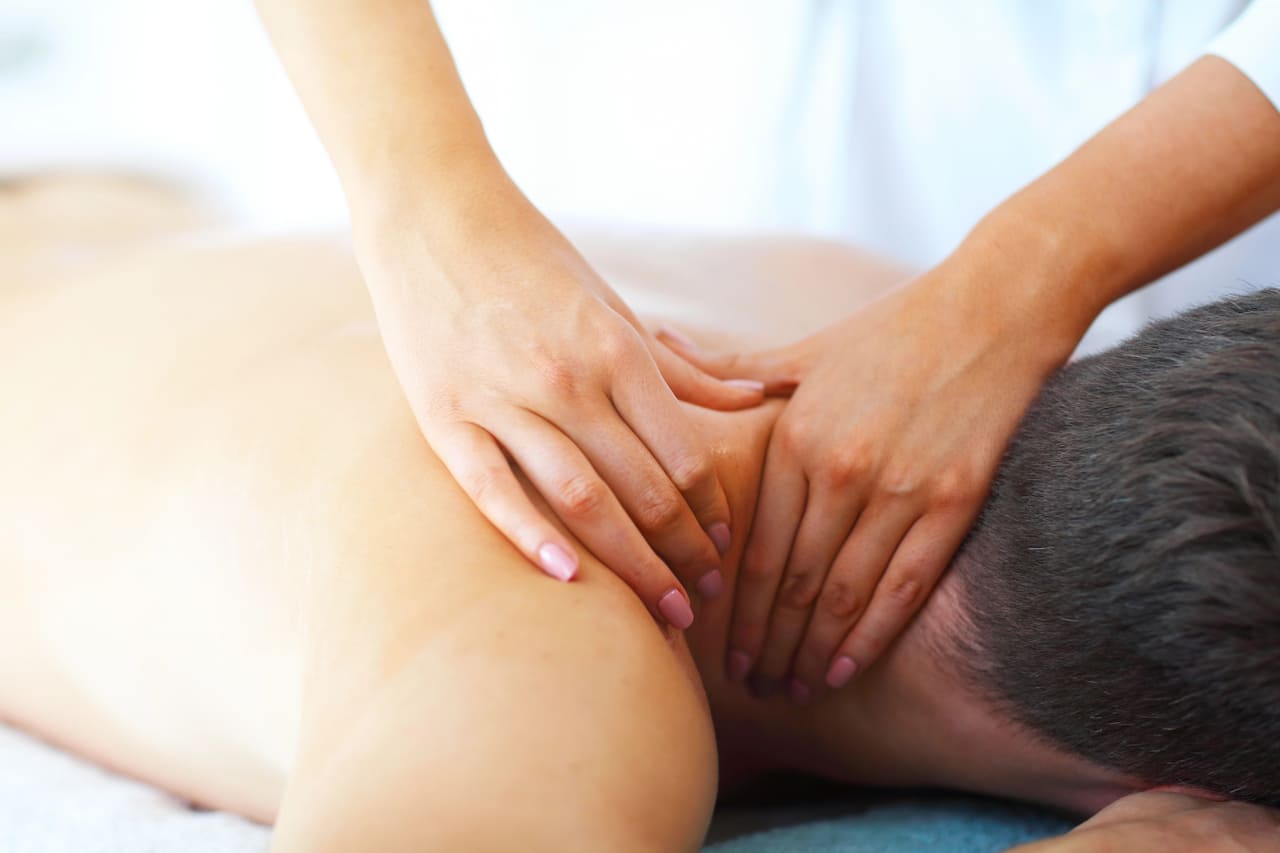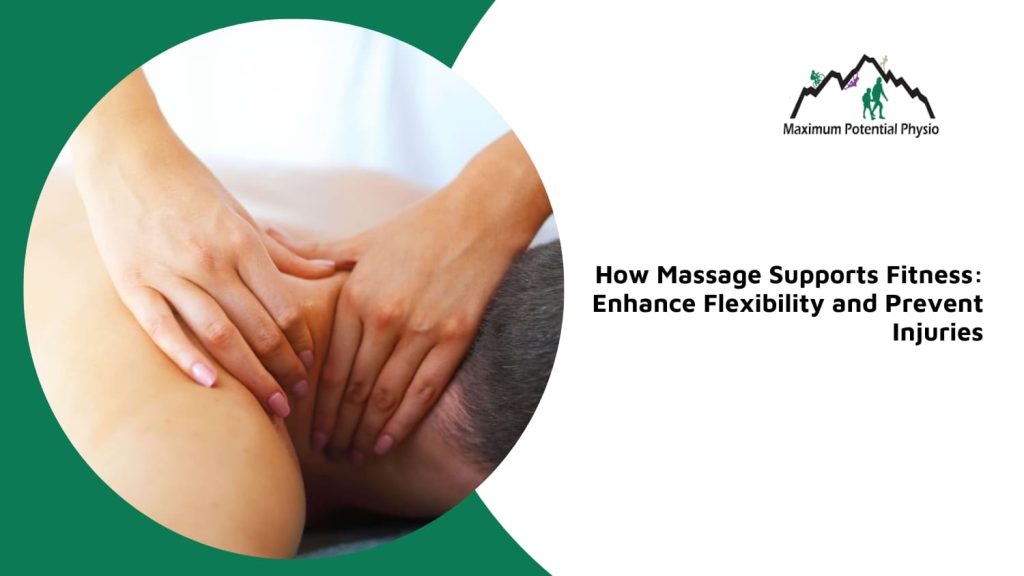How Massage Supports Fitness: Enhance Flexibility and Prevent Injuries

Massage therapy has long been a staple in the health and fitness industries, offering a multitude of benefits from stress relief to enhanced physical performance. As individuals increasingly aim to optimize their fitness routines, the role of massage therapy becomes even more crucial. It not only aids in muscle recovery but also supports injury prevention and overall physical well-being. In this blog, we will explore how massage therapy can be an integral part of achieving fitness goals, the types of massage best suited for athletes, and how it can enhance athletic performance, among other benefits.
What Common Fitness Goals Can Massage Therapy Support?
Massage therapy supports various fitness goals, including enhancing flexibility, speeding up muscle recovery, and reducing injury risk. It is particularly beneficial for individuals looking to improve athletic performance, manage stress, and maintain overall physical health.
| Enhanced Athletic Performance | Consistent massage can enhance muscle function and flexibility, essential for peak athletic performance. |
| Increased Flexibility | By reducing muscle tension, massage therapy enhances flexibility, allowing for a greater range of motion during workouts. |
| Faster Recovery Times | It helps in flushing out toxins and lactic acid from the body, facilitating quicker recovery after intense workouts. |
| Injury Prevention | Regular massages can help identify and address muscle imbalances or tightness, thus reducing injury risk. |
| Stress Management | By promoting relaxation and reducing cortisol levels, massage therapy helps manage stress, which can improve focus and performance. |
| Improved Joint Mobility | Massage can enhance joint flexibility, which is essential for exercises demanding high mobility. |
| Chronic Pain Management | It provides relief from chronic pain conditions, enabling individuals to engage more effectively in physical activities. |
Overall, massage therapy is a versatile tool that supports numerous fitness goals, from enhancing performance to preventing injuries and managing stress.
What Types Of Massage Are Best For Athletes And Fitness Enthusiasts?
Athletes and fitness enthusiasts benefit from massages such as Swedish, deep tissue, sports, and trigger point therapy. These types are tailored to improve flexibility, enhance recovery, and reduce the risk of injuries.
| Swedish Massage | Known for its gentle techniques, it enhances relaxation and blood circulation, benefiting athletes in recovery phases. |
| Deep Tissue Massage | This technique targets deeper muscle layers, releasing chronic tension and improving flexibility and performance. |
| Sports Massage | Specifically designed for athletes, it focuses on areas of the body that are overused and stressed from repetitive movements. |
| Trigger Point Therapy | This type targets specific points of tightness, relieving muscle knots and enhancing muscle function. |
| Myofascial Release | It focuses on relieving tension in the connective tissues, enhancing flexibility and joint mobility. |
To maximize performance and minimize the risk of injury, athletes and fitness enthusiasts can benefit from massage techniques that relieve muscle tension and promote effective recovery.
Can Regular Massage Improve Athletic Performance?
Yes, regular massage can improve athletic performance by enhancing muscle flexibility, reducing recovery time, and preventing injuries. It also supports mental focus and stress management, which are critical for optimal performance.
- Enhanced Flexibility: Regular massage therapy reduces muscle tension and enhances joint mobility, which are essential for peak athletic performance.
- Reduced Recovery Time: By improving circulation and flushing out toxins, massage therapy accelerates the recovery process, allowing for more frequent and effective training sessions.
- Injury Prevention: Regular sessions help in identifying and addressing muscular imbalances, reducing the risk of injuries.
- Improved Mental Focus: By reducing stress and promoting relaxation, massage therapy enhances mental clarity and focus, essential for athletes.
- Increased Endurance: Through better muscle function and oxygen flow, massage therapy can improve endurance levels.
- Pain Management: It provides relief from chronic pain, enabling athletes to train harder and more effectively.
- Muscle Function Optimization: Massage therapy enhances muscle function by reducing tightness and improving flexibility.
In summary, regular massage therapy is a valuable asset for athletes, enhancing performance through improved flexibility, quicker recovery, and better mental focus.
Can Massage Therapy Improve Muscle Recovery After Workouts?
Massage therapy significantly improves muscle recovery after workouts by enhancing blood circulation, reducing muscle tension, and promoting relaxation. This therapy accelerates the removal of metabolic waste from muscles, allowing them to recover faster and more effectively. By reducing inflammation and muscle soreness, massage therapy aids in the regeneration of muscle tissues, which is crucial for those engaging in intense physical activities. Additionally, massage therapy helps in maintaining proper muscle function and flexibility, which are essential for preventing future injuries.
The increased blood flow facilitated by massage therapy ensures that tissues receive adequate oxygen and nutrients, promoting quicker repair and recovery. Furthermore, the relaxation induced by massage therapy can alleviate stress, which might otherwise impede the recovery process. By integrating massage therapy into a regular fitness routine, individuals can experience improved recovery times, reduced muscle soreness, and enhanced overall physical well-being.
Overall, massage therapy is an effective method for improving muscle recovery after workouts, thanks to its ability to enhance circulation, reduce tension, and promote relaxation.
Is Massage Therapy Effective For Reducing Post-Workout Muscle Soreness?
Yes, massage therapy is effective for reducing post-workout muscle soreness by improving circulation, reducing inflammation, and alleviating muscle tension. Its benefits extend to quicker recovery and enhanced muscle function.
- Improved Circulation: Massage therapy enhances blood flow, which helps deliver essential nutrients and oxygen to muscles, aiding in the reduction of soreness.
- Reduced Inflammation: By stimulating the lymphatic system, massage therapy helps decrease inflammation and swelling in muscles.
- Alleviated Muscle Tension: It releases tightness in muscles, which can alleviate soreness and improve flexibility.
- Increased Endorphin Levels: Massage therapy promotes the release of endorphins, the body’s natural painkillers, reducing the perception of pain.
- Enhanced Muscle Function: Regular sessions can improve overall muscle function, reducing the likelihood of soreness after workouts.
- Stress Relief: By promoting relaxation, massage therapy can decrease stress levels, which can contribute to reduced muscle tension.
- Enhanced Recovery: It accelerates the removal of lactic acid and other metabolic byproducts, promoting a faster return to activity and reducing discomfort.
Key takeaways: Massage therapy is highly effective in reducing post-workout muscle soreness by enhancing circulation, reducing inflammation, and alleviating muscle tension.
How Often Should You Get a Massage for Optimal Health and Fitness Benefits?
For optimal health and fitness benefits, it is recommended to get a massage every one to two weeks, though this can vary based on individual needs and activity levels. Regular sessions support muscle recovery, enhance flexibility, and reduce the risk of injuries. By integrating massage therapy into a regular health routine, individuals can maintain muscle function, improve circulation, and manage stress more effectively. Those engaged in high-intensity workouts may benefit from more frequent sessions, as they can help address muscle tension and prevent potential injuries. On the other hand, individuals with lower activity levels might find monthly massages sufficient for maintaining overall well-being.
Regular massage therapy can also enhance mental focus and reduce stress, contributing to improved performance in both physical and mental activities. By consulting with a professional, individuals can determine the frequency that best suits their specific health and fitness goals.
In summary, the frequency of massage therapy should be tailored to individual needs, with regular sessions providing significant benefits for muscle recovery, flexibility, and overall well-being.
Unlock Your Athletic Potential
Massage therapy is a vital component of a comprehensive fitness strategy, offering numerous benefits that support both physical and mental health. Whether you're looking to enhance performance, prevent injuries, or simply recover more efficiently, incorporating regular massage sessions can make a significant difference.
Maximum Potential Physiotherapy in Calgary NW is here to provide personalized support tailored to your unique fitness goals and needs. Contact us today to explore how our services can help you achieve your maximum potential in both fitness and well-being.
Frequently Asked Questions
Is Massage Therapy Suitable for All Fitness Levels?
Yes, massage therapy can be tailored to suit all fitness levels, from beginners to professional athletes. It can be adjusted to meet individual needs and support various fitness goals.
How Does Massage Therapy Enhance Flexibility?
Massage therapy enhances flexibility by reducing muscle tension and improving joint mobility. Regular sessions can help increase the range of motion and prevent stiffness.
Can Massage Therapy Help with Chronic Pain Management?
Yes, massage therapy can provide relief for chronic pain conditions by reducing muscle tension and improving circulation, which helps alleviate pain and discomfort.
What Should I Expect During a Sports Massage Session?
A sports massage session typically focuses on specific muscle groups that are used heavily in sports activities. It involves techniques that relieve tension, improve flexibility, and enhance overall muscle function.
How Does Massage Therapy Support Mental Health?
Massage therapy supports mental health by promoting relaxation and reducing stress levels. The release of endorphins during a session can enhance mood and improve mental clarity.

